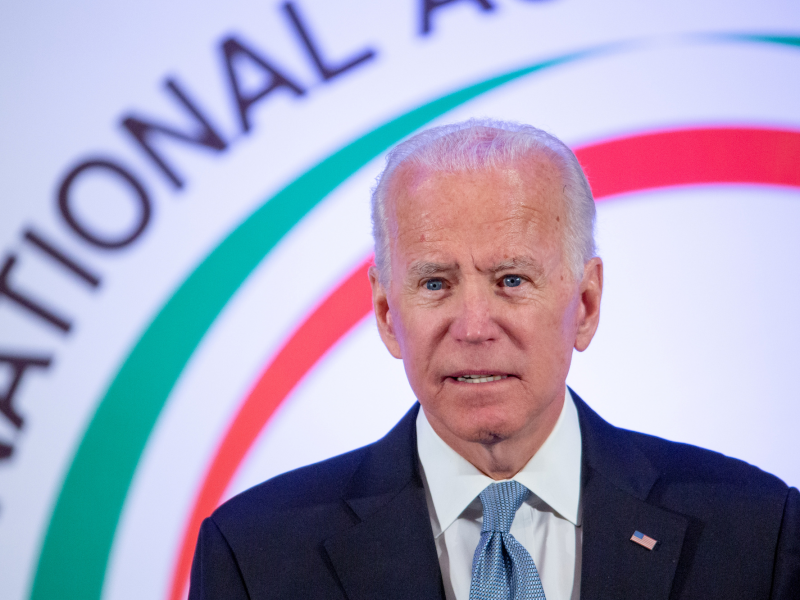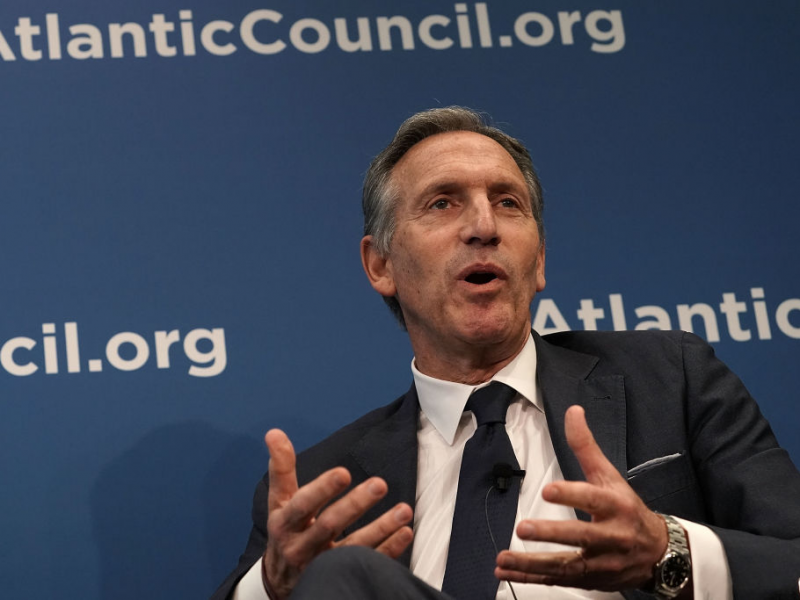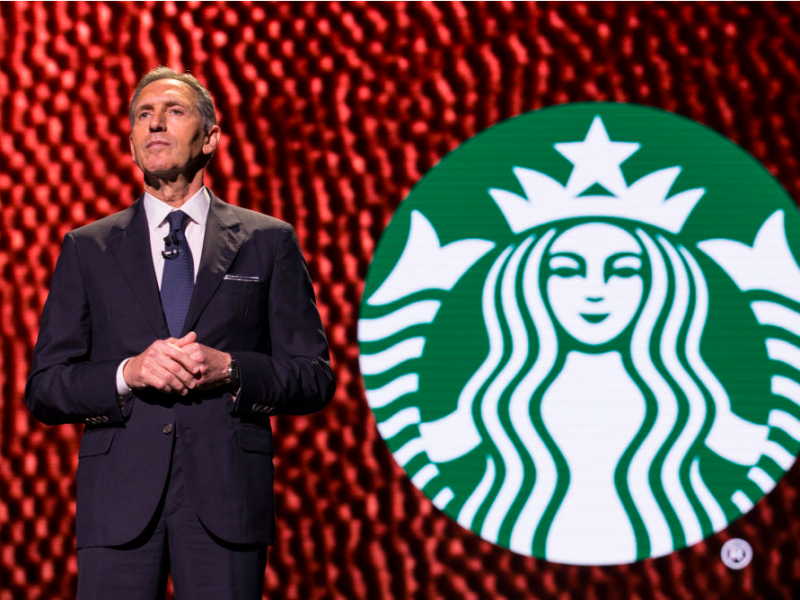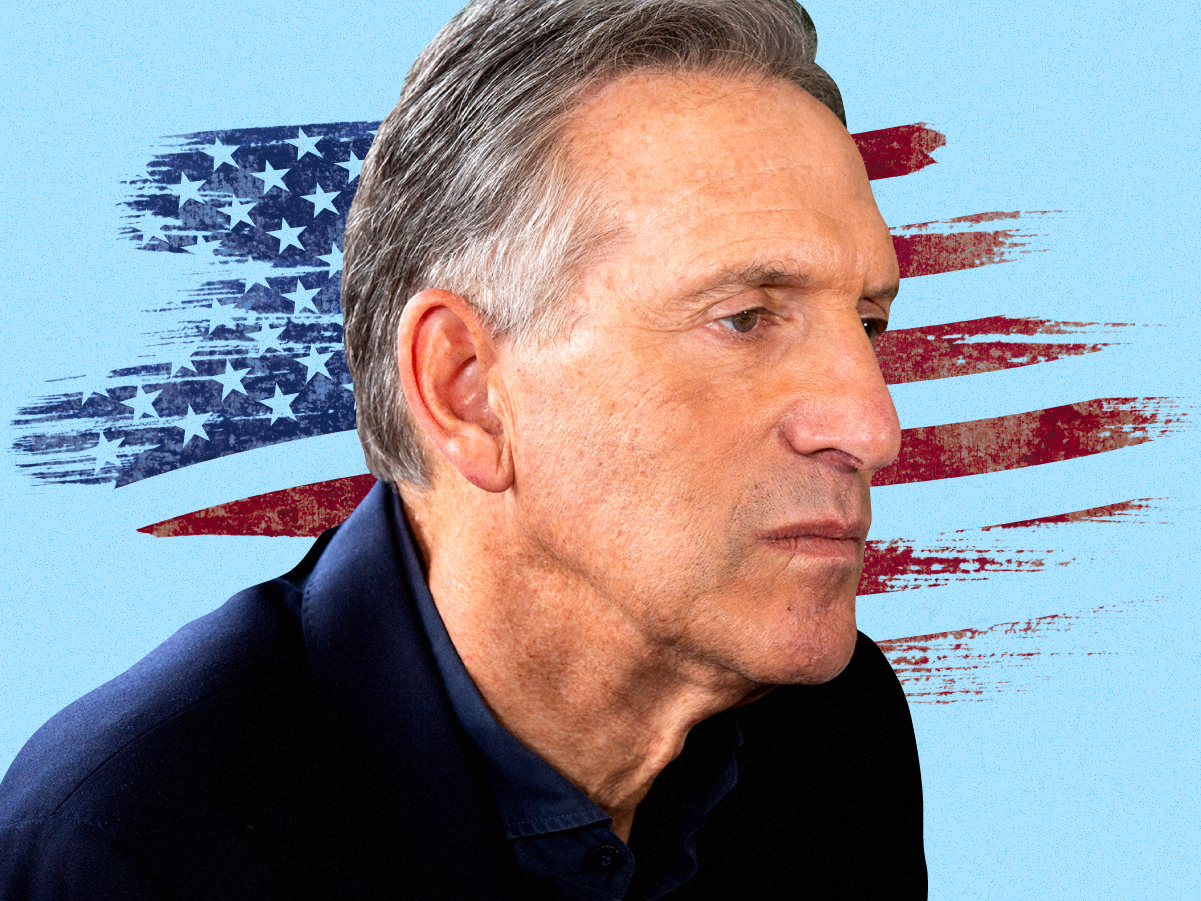- Howard Schultz in January announced he was “seriously considering” running for president as a centrist independent after a long career leading Starbucks.
- In an interview with Business Insider, Schultz said his candidacy could help fix what he described as a “corrupt” two-party political system.
- Schultz expressed admiration of former Vice President Joe Biden – who is also considering a 2020 presidential run – but said it was too early to say whether Biden’s decision would affect his own.
- He criticized what he said was a “vilification” of business success but said he did not think his extreme wealth would hurt his chances in a presidential race.
- Schultz said he opposed Sen. Elizabeth Warren’s plan to break up big tech companies as well as efforts to lower the age requirement to run for president so someone such as Rep. Alexandria Ocasio-Cortez could run.
- Read on for the full interview, watch his appearance on Business Insider Today.
As the longtime CEO of Starbucks, Howard Schultz revolutionized how America thinks about coffee. Now, he’s convinced he can do the same for politics.
In January, Schultz announced he was “seriously considering” running for president as a centrist independent. In the weeks since, he has faced backlash for what many believe to be an unachievable plan, one some experts say could help reelect President Donald Trump.
Schultz, however, says he is convinced that a presidential run by him could help fix America.
He told Business Insider in an interview last week that he was “as concerned with the current left-leaning tilt of the Democratic Party towards socialism” as he was about the chances of Trump being reelected. “Both these solutions, in my view, would be a terrible choice for the American people in 2020,” he said.
Schultz sat down with Business Insider in Denver to discuss his motivations, thoughts on certain policies, and beliefs about corporate responsibility. Here is how the former Starbucks CEO is thinking about politics two months after announcing his presidential aspirations.
The following interview was edited for length and clarity.
Kate Taylor: You have conducted many job interviews, hiring people at Starbucks. What was your favorite job-interview questions to ask people to see if they'd be a good fit for the company?
Howard Schultz: I often ask people what book they are reading.
Taylor: So, what book are you reading?
Schultz: I just finished Doris Kearns Goodwin's book on leadership, ["Leadership: In Turbulent Times"], in which she kind of analyzed the leadership of four presidents. It was a very timely book, very revealing.
I had the good fortune last month of having her interview me on my book tour. And I had such a crush on her. I couldn't believe I was actually sitting onstage with her, and she had a great line when she started interviewing me. She said, "You know you're one of the first people I've interviewed who are alive." Because she's a historian and anyway that's how we started.
She's an American treasure, and I just finished that book.
Taylor: As you've been through the last couple months traveling the country, what factors are feeding into, at this point, if you decide to run for president or not run for president?
Schultz: Well, seven weeks ago I said I am seriously considering running for president as a centrist independent outside of the two-party system. The two-party system is broken in many ways, and it's corrupt, and it's clearly not serving in the interest of the American people.
And so what I've decided to do is very thoughtfully travel the country, and even before the book tour started I've been doing that, and trying to do everything I possibly can to understand the issues, the challenges, the aspiration that the American people have that are different than what I might normally see in my hometown of Seattle, Washington.
What I've learned is a few things. One, that every single day there are ordinary Americans doing extraordinary things in their local community, in their local town, and they're living their life because they're not concerned about politics, they're concerned about their family and their children.
But at the same time I've also noticed there's a cloud hanging over the country and a cloud hanging over the American people, and it's a sadness. And the sadness is a lack of trust and faith in what I would characterize as the promise of the presidency and, certainly, a lack of trust in our leaders. I think lack of trust in the truthfulness of the president, lack of trust and confidence in the extreme ideology of both parties, and the constant episodic issues everyday of fighting and not solving the problems.
When you talk to and sit down in small groups, either around a kitchen table or a library, people talk to you about what they are really concerned about, and it's the everyday life. That has in many ways provided me with much more insight, and I also say much more empathy, compassion to understand that what we're lacking right now is a lack of civility, a lack of truth, a lack of grace, and all of that, for me, speaks to leadership.
I spent the last 40 years of my life building a global enterprise that has done things, not because they were smarter or better, but we've done things through the lens of humanity. Comprehensive health insurance 20 years before the Affordable Care Act, ownership for every employee, free college tuition - at the same time that Starbucks stock goes up 25,000% since we went public in June of 1992.
I have a track record of demonstrating that you can do these things in a way that is performance-based through the lens of humanity, and in may ways I think that is applicable to what is necessary now. We have a $22 trillion debt, we're spending $500 billion of interest expense. That's a lack of leadership. That's reckless abandonment, abdication of the responsibility that members of Congress have to the American people, and why that's immoral in my view is because that debt is going to be on the backs of my children and grandchildren and the children and grandchildren of people I've met.
The immigration issue, to me, should easily be solved, but what I've come to believe is that Republicans and Democrats on both sides don't want to really solve the problem. They'd rather have this as a political issue, not allowing either side to win, to claim victory than provide the American people with a common-sense solution that 80% of the American people want. So when 80% of the American people want a common-sense solution on a number of things, and common sense on immigration, common sense on gun legislation. And, the question I'm asking is what kind of country are we living in, in which the elected officials are not only abdicating their responsibilities but ignoring the will of the people?
That is why I'm seriously considering running for president as an independent. But, mostly it is my love of the country. I'm living proof, like many Americans, that my station in life growing up in the projects did not define where I will end up. And the odds of me getting from there to here are virtually impossible, but it only can happen in America. And I want to see that preserved, enhanced, and that is what I'm considering trying to do.
Schultz, Biden, and Bernie

Taylor: Have there been any changes as more potential Democratic nominees have emerged? Is there any Democratic nominee or potential nominee that you think could address these issues?
Schultz: I'm as concerned with the current left-leaning tilt of the Democratic Party towards socialism and the leading Democratic nominees at this point - given the fact that we're 18 months away - I'm equally concerned about that as I am about reelecting Donald Trump. Both these solutions, in my view, would be a terrible choice for the American people in 2020. So, regardless of who runs at this point, that is not what I'm looking at. I'm looking at the American people and asking myself, "How can I serve them?" And it's not about who's running on the Democratic side at this stage.
Taylor: So if someone who was more moderate - such as Joe Biden, for example - is the Democratic nominee, that wouldn't make a difference, as opposed to Bernie Sanders being the nominee?
Schultz: First, we're 18 months away. I think it's instructive that Mayor Bloomberg did not run as a moderate Democrat, could not find a path. Whether Vice President Biden runs or not, it would be interesting to see whether he can find a path. But, it's too early for me to answer that question.
What I want to try and do is make my case to the American people. The crowds that I'm talking to are getting larger. I can sense that ... what I'm saying is resonating because they are longing for truth. They're longing for leadership they can believe in, and there is a widespread recognition that the system is not working, and that both parties are involved in revenge politics every day.
Taylor: Are there any potential candidates that you do admire, or traits that you admire?
Schultz: Oh, I admire Vice President Biden. I know him, I've traveled with him. How could I not admire him? He served the country for 40-plus years - he's a great man.
And let me say this, which I think is very important. I was very critical of the Green New Deal for a whole host of reasons, but that's not to say I'm critical of the people.
So I want to make this very important point, and that is that these are well-intentioned people who I believe, believe what they're trying to do. I just don't agree with their policies and positions. So I have my own view of how to solve some of these problems. And, what I don't like is the insincerity of suggesting things that are either unconstitutional, that the country can't possibly pay for, and most importantly won't work.
I want to say this very clearly, and that is in the last few months, there's been a level of vilification of business, business success, and specifically capitalism. I have been a capitalist my whole life, but I demonstrated that you can be a performance-driven business through the lens of humanity. And I think business and business leaders have a moral obligation to do more in the future, but our democracy and our free-enterprise system is based on capitalism, and if you look at the history of the world, in the United States our economic engine and capitalism has done more to create economic opportunity, lift people out of poverty, create more jobs, innovation, solved significant problems, and create so much opportunity.
So let's be careful with where we're headed, and that's why I'm equally concerned about both a socialist democratic president as well as reelecting Donald Trump.
The billionaire problem

Taylor: When 15 families can have $600 billion in wealth, as the average person is struggling in this country - how do you want to solve that issue?
Schultz: I think there is a level of morality that we must address, and I think this goes back to my own upbringing. I still have the scars, the vulnerability, the shame, the insecurity of growing up in a family where my parents couldn't afford the $96-a-month rent for the apartment in the projects. That just never left me - like all of us, my childhood experiences have defined me.
The level of inequality and the fact that this president is using the stock market as a proxy to the economy when over 40% of American families are $400 away from crisis. The next president of the United States must do a number of things to significantly address with urgency the level of inequality.
Now, the government itself is not going to be able to solve those problems, not when we're sitting with $22 trillion of debt ... The president of the United States gave a 21% tax rate to corporations and did not address comprehensive tax reform and infrastructure development, all of which would be of aid to and help American families who are not part of the corporation that are not benefiting from the 21% tax rate.
This is what is wrong, and so if I run for president and am fortunate to win, what I can promise you is I will address the issues of inequality in many ways, because I have great empathy and compassion, because I was one of those people once in my life. And I'm in a unique position of having lived on both ends of the spectrum.
In terms of your specific question, I do believe that business has an obligation to do more for their employees and the communities they serve. I think the wealthy should be paying more in taxes. I think the corporate tax rate should not be at 21% - it should be higher, with an incentive built in to do more for your people. So I think there are ways to address this problem that could significantly narrow the gap, but what are we really talking about? We're talking about leadership. We're talking about compassion. We're talking about truthfulness, and when this president stands up, when he talks to the American people how great the economy is, it may be great for a select group of people, but the vast majority of Americans are living paycheck to paycheck.
Taylor: Do you think being someone who came from the projects but is, at this point, very wealthy, has been helpful for you in your campaign, or has that been hurtful for you in your campaign?
Schultz: I don't think it's been hurtful. I think people know my story, and I think when people look at the track record of Starbucks and they see, "Wow this is a company that's had 25,000% increase in stock price but, most importantly, has created a fragile balance between profit and responsibility and shared success."
So I've learned two things in business that I think are applicable to whether or not I run for president. And, that is not every business decision is an economical one - sometimes you have to invest in the future of your people because it's the right things to do for the business - and the second thing is Starbucks' success is threaded directly to the fact that success is better when it's shared. We have linked shareholder value with value for our people, and so the promise to the country and the American dream can't be for a select group of people. We have to open up the aperture so air can go in. We have to restore the promise.
The other thing I want to say is that the character and the tonality of America is specifically linked to the character, morality, the decency, the dignity, and the grace of the Oval Office. Not only here at home, but also abroad. What I want to do if I run for president and am fortunate enough to be elected is I will restore honor and dignity back to that Oval Office.
Diversity in the White House

Taylor: Something else you have said if you run for president, you've promised to have more women in your cabinet than any other president. Do you have a quota for that? Do you have a percentage? How do you achieve that?
Schultz: If you look at my history, the Starbucks board of directors that I put together is 40% women. And very, very diverse - over 40% of Starbucks and our company is diverse and women.
The commitment I've made is that the cabinet will be the most diverse cabinet in the history of the country and have more women on the cabinet than any other cabinet in American history. Note, that is just a commitment I'm making, and it's not because it's a political slogan - it's because it's the right thing to do. And the American people should look at government with great pride, and it should be a reflection of the American people. And that's what I would do.
Taylor: Could you commit to having a female vice president?
Schultz: At this point, I would say that I haven't decided to run for president yet, and when I make that decision in late spring, early summer, I'll answer that question with great specificity. But, I am encouraged by the amount of women that are running for president on the Democratic side.
I think it is a great example to every young girl and every woman in America about the power of women and what this means in terms of the respect that we must have for women in high office. I did a town hall yesterday with a group of entrepreneurs, and someone said, "How many women are there at Starbucks who've left and are CEOs?" And we started listing them, and I'm so proud of the fact that we nurtured and helped create women who are running public companies today, who were leaders at Starbucks. And so I take great pride in that.
Gender pay and parental leave at Starbucks and gender pay - these are things that I think are so vitally important of the demonstration of a level of understanding, the sensitivity that business needs to transform. That we have a moral obligation to do the things necessary, that demonstrates a level of respect for the people who are doing the work and that respect, I think is not only in the sector of business and commerce but also government.
Taylor: Elizabeth Warren has proposed that large tech companies such as Amazon should be broken up. What are your thoughts on that policy?
Schultz: I certainly have heard that proposal.
Let me take a step back from the question and explain to you what I think has happened. These tech companies certainly have become very large and very powerful, I get that. The issue and the question is regulation versus oversight. Because these companies have developed with great speed a level of technology, that technology has outpaced the government's ability to create legislation and oversight. Specifically on the issue of privacy. So the government has a responsibility to have domain experts to understand what oversight is necessary, but the problem started with the fact that these companies outpace the government's ability to understand what oversight is necessary.
So, I do not agree with Elizabeth Warren. What I do agree with is the government needs to create oversight, not regulation, oversight to provide the American people with safety and security, specifically on the issue of privacy.
Taylor: With the age restriction on running for president, do you think it's fair that someone like Alexandria Ocasio-Cortez cannot run for president because she's too young?
Schultz: I would just yield to the Constitution that I think has served the American people well for a number of years. I don't think it's about one person, I think it's about what the Constitution has provided the American people.
But, obviously the experience, life experience, professional experience that anyone needs to run for office and hold the highest office of the land, the most powerful person in the world ... We need the right person to be the next president of the United States, to navigate through a series of issues, serve the American people well, restore our standing in the world, and elevate the issues that we have discussed, specifically the level of inequality. And I think most of all, restore trust and confidence in the promise of the country in leadership, in institutions, and in our government. Once again, I think we're talking about leadership, servant leadership. The next president of the United States needs to serve the American people, every single person.
